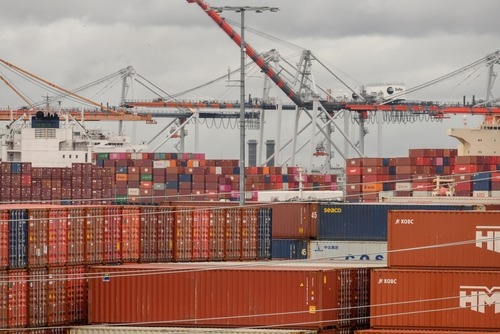
U.S. Reps. Brian Fitzpatrick (R-PA), Rosa DeLauro (D-CT), Victoria Spartz (R-IN), and Bill Pascrell, Jr. (D-NJ) introduced new legislation that seeks a new review process for the nation’s supply chain to screen out vulnerabilities and exploits for national adversaries.
“The unfolding global supply chain crisis is evidence that America can no longer afford to rely on foreign adversaries like China and Russia for our essential goods and supplies,” Fitzpatrick said following the introduction of the National Critical Capabilities Defense Act. “The NCCDA is an immediate, bipartisan response to the supply chain bottleneck that is plaguing our country and will increase transparency surrounding the offshoring of critical industries and manufacturing. We must act now to ensure the U.S. has a resilient and secure supply chain that will bolster American innovation, job creation, and national security.”
Specifically eying national competitors such as China and Russia, the lawmakers’ proposal would create the National Critical Capabilities Committee (NCCC) and empower it to review and block U.S. production offshoring, development, or manufacturing of identified critical national capabilities being made within nations dubbed adversarial. In the era of COVID-19, this would include medical supplies but also items critical to the electrical grid and national security.
“The COVID-19 pandemic and semiconductor shortages exposed that critical United States supply chains were not up to the task of robustly responding to America’s needs,” DeLauro said. “We have to learn from our mistakes and cannot allow outbound investments from the United States to take critical supply chains overseas and into the hands of our adversaries such as China or Russia. Companies at a minimum should be required to report on their proposed offshoring of supply chains so the United States can better protect critical manufacturing capacity here at home and safeguard American workers and our national, economic, and health security.”
In addition to the NCCC, which would be composed of representatives from various federal agencies, the legislation would also establish coordination between such federal agencies and empower the President to take action and shut down any national security risks associated with a supply chain transaction. A rulemaking process would also be launched to add relevant industries to the NCCC’s oversight as needed, while Federal Acquisition Regulation would be revised to alter request for proposals to request firms disclose both sourcing and supply chains contractors would use, an estimate of their impact on U.S. jobs and any reliance on foreign-made materials.
Complementing these efforts, U.S. Sens. Bob Casey (D-PA) and John Cornyn (R-TX) have introduced the same legislation in the Senate.




